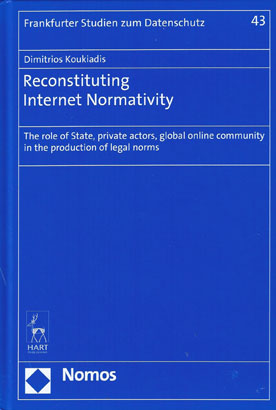
Can we have legitimate internet law without State institutions and authorities? What principles and criteria should be taken into consideration in producing internet's legal rules?
Who should be the author of internet's normativity? Principles such as the "Rule of Law", Representation, Legitimacy, Transparency, Accountability do not seem any more to play an important role in producing online rules and norms, and fundamental rights such as protection of personality, personal data protection, informational self-determination have acquired a lesser importance in the internet environment.
Instead, concepts such as "Lex Digitalis", "Transnationalisation of Law", "Global law without the State", have obtained the leading role in the internet regulation debate and in a perspective meta-Statal legal order. Different legal regimes created on the principles of self-regulation, decentralization, heterarchical social peripheries have corroded the understanding of Law and Constitution as an "Entity". Can such a legal order be viable, coherent, and legitimate?